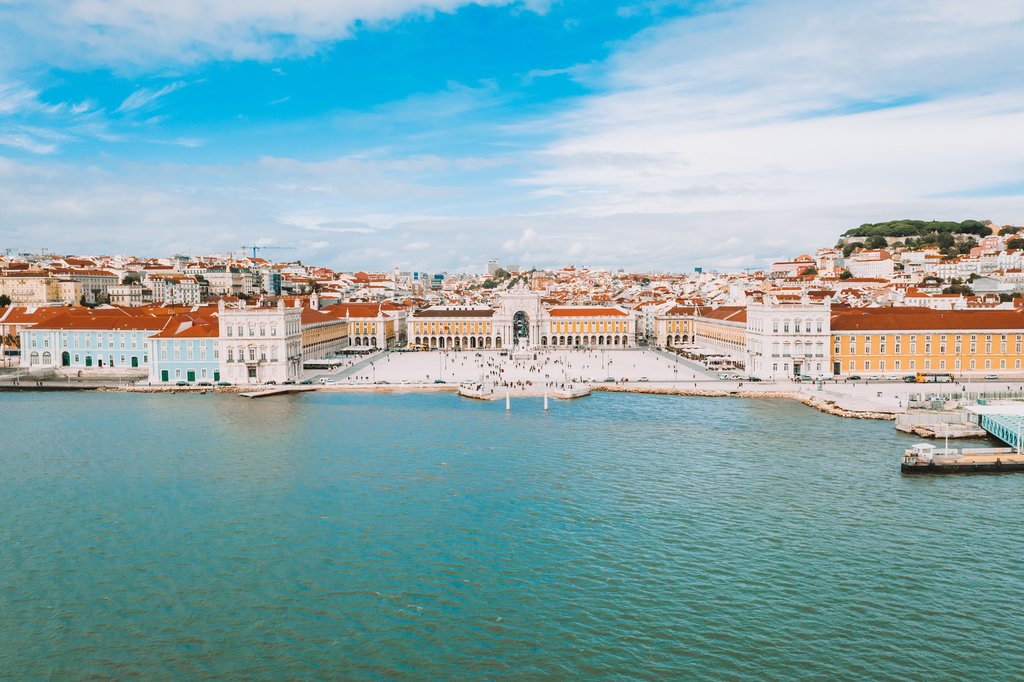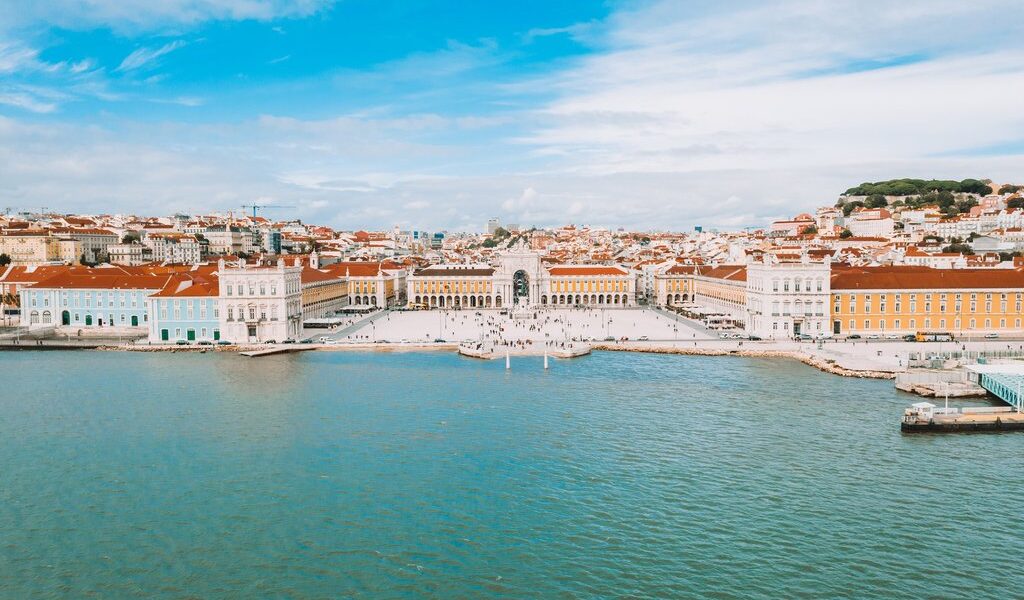
July marks the start of peak summer season in Portugal, and just chilling on the coast appears more enticing than ever, with refreshing Atlantic waves to dive into, breezes taking the edge off the heat and ice-cream close by. The major cities and resorts are humming, and festivals are bringing a buzz to all corners of the country. If you like things lively, now’s the time to go.
## Weather in Portugal in July
July in Portugal signals the arrival of true summer, with the sun dominating the skies and offering long, warm days. The heat truly intensifies, with temperatures often climbing to levels that require a strategic approach to sightseeing and activities. During the day, temperatures can reach a scorching point, demanding ample sun protection and hydration. However, these warmer days give way to balmy evenings, creating a pleasant atmosphere ideal for enjoying the coastal scenery. These evenings are perfect for relaxing with sundowners by the sea, exploring open-air cafes, and indulging in delightful alfresco dining experiences. The inviting climate encourages extended evenings spent outdoors, savoring the local cuisine and enjoying the vibrant atmosphere.
When considering the regional variations, the weather differs slightly throughout the country. In the north, specifically in the beautiful city of **Porto**, the weather is warm rather than intensely hot. Average temperatures hover around a comfortable 77°F (25°C), making it a pleasant destination for those who prefer milder heat. **Lisbon**, the capital city, experiences a hotter and drier climate during July. High temperatures reach around 82°F (28°C), with rainfall being virtually non-existent. The dry heat makes it essential to stay hydrated and seek shade during the hottest parts of the day. Further south, in the popular **Algarve** region, the heat intensifies even further. Highs of around 86°F (30°C) are common, often making even the simplest activities, like adjusting your beach towel, feel like a significant effort. The southern coast revels in sunshine, and water sports become a popular way to beat the heat.
To fully enjoy your time in Portugal in July, it is crucial to pack accordingly. Sunblock with a high SPF is essential to protect your skin from the strong sun, especially along the coastline. A sunhat will also provide vital shade and help prevent overheating. Ensuring you drink plenty of water throughout the day is paramount to avoid dehydration in the warm climate. Being prepared for the heat ensures a more enjoyable and comfortable travel experience.
## Crowds and Costs During Peak Season
The abundance of sunshine in July is undoubtedly alluring for those seeking lazy days on the beach. However, the popularity of Portugal as a summer destination also means dealing with larger crowds, particularly in the major cities and coastal resorts. As many schools enter their vacation period, the demand for travel increases significantly. Consequently, flight prices and room rates tend to soar, sometimes doubling or even tripling compared to the lower seasons. Booking flights and accommodation in advance is highly recommended to secure the best deals and avoid disappointment.
Given the increased demand, it is crucial to plan and book well in advance to ensure you secure your first choice of accommodation and activities. The most sought-after hotels and experiences are quickly snapped up by early bookers. Therefore, making reservations well ahead of your travel dates is essential. Top-rated restaurants and popular activities may also require pre-booking to avoid long queues or being turned away due to full capacity. If you are planning a trip to the southern **Algarve**, be sure to check that your accommodation includes air conditioning, as it will be invaluable for a comfortable stay during the hottest days and nights.
## Where to Venture in July
The warm weather of July encourages many to flock to the coast. Even the Portuguese themselves often head en masse to the nearest beach on weekends. However, if the southern **Algarve** feels too crowded for your liking, consider exploring alternative coastal regions. The north and west Atlantic coast offers a more relaxed atmosphere, with plenty of breathing room and beautiful sandy beaches backed by dunes. Exploring these less-crowded coastal areas allows you to experience the natural beauty of Portugal without the overwhelming crowds.
With cities becoming increasingly crowded and hotel availability limited, July might be the perfect time to explore destinations further afield for a cultural experience. The northern city of **Coimbra** is a jewel, boasting a hilltop medieval center, a historic university steeped in tradition, and a rich heritage of *fado* (folk music). Alternatively, consider venturing to **Braga** in the Minho region, a city characterized by its winding alleyways and profound spirituality. It is home to an incredible Romanesque cathedral, the oldest in the country, dating back to 1070. The cultural and historical attractions of these cities are a welcome distraction from the coastal crowds.
If you are seeking respite from the coastal heat and crowds, head inland to the mountains. The mountainous regions offer cooler temperatures and a more tranquil atmosphere. The **Beiras** region is sprinkled with charming stone-built villages and crisscrossed with excellent walking trails, providing ample opportunities for outdoor activities. The climate is also comparatively cool, with temperatures around 66°F (19°C). Another good off-the-radar option is the **Minho** region, bordering Spain in the north.
## Activities to Enjoy in July
If your primary goal is relaxation or enjoying watersports on the beach, July presents an ideal setting. However, be prepared for popular beaches to be jam-packed. If you are planning a trip to the **Algarve**, consider venturing to more secluded west-coast beaches. For example, the cliff-backed **Praia do Amado** and **Praia da Arrifana** are both surfing havens. Further north, on the Costa Verde in the Minho region, **Viana do Castelo** boasts a medieval center alongside long, golden, dune-fringed sands. Exploring these less-crowded beaches allows you to experience the natural beauty of the coastline without the overwhelming crowds.
The northern **Minho** and **Beiras** regions offer a low-key vibe, higher elevations, and cooler temperatures, making them particularly appealing during this time of year. Embark on backcountry walks or a scenic road trip, hopping from one gloriously sleepy village to the next. These regions have strong shepherding traditions, with farmsteads nestled among meadows and forests of pine and cork oak. Hiking is particularly rewarding in the national parks and nature reserves, such as **Serra da Estrela** and **Peneda-Gerês**. These parks feature granite peaks, hidden lakes, and thick forests, providing breathtaking scenery and challenging hiking opportunities.
## July Events and Festivals
Portugal’s vibrant culture shines through in its array of July events and festivals. Given the popularity of these events, booking tickets well in advance is essential, as they often sell out rapidly.
**Festival ao Largo** transforms Lisbon’s Teatro Nacional São Carlos into an open-air stage, hosting orchestras and ballet troupes. This free three-week festival offers a fabulous way to spend a hot summer evening, enjoying world-class performances under the stars.
**Festival Internacional de Folclore** takes place in **Porto** during the last week of July. This vibrant festival features folk music, dancing, and elaborate traditional costumes, attracting acts from all over the country.
**MEO Marés Vivas** is a raucous three-day rock and pop festival held in **Vila Nova de Gaia** in **Porto** during the third week in July. The festival has previously featured headliners such as Sting and Keane.
**NOS Alive** takes place in Algés, on **Lisbon’s** western fringes. This mammoth rock, indie, and alternative music festival has seen Pearl Jam and Taylor Swift grace the line-up in previous years.
B-2190

